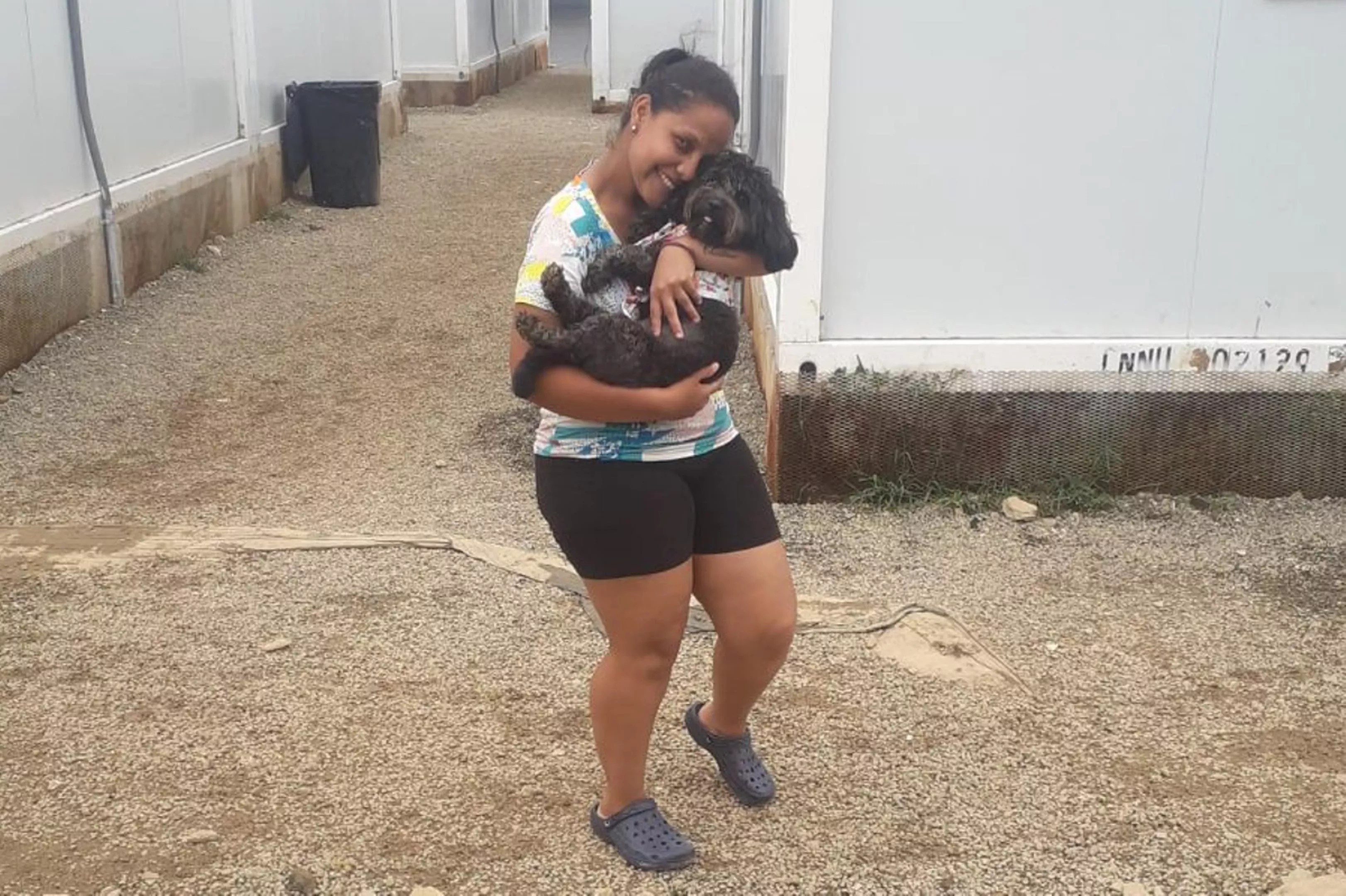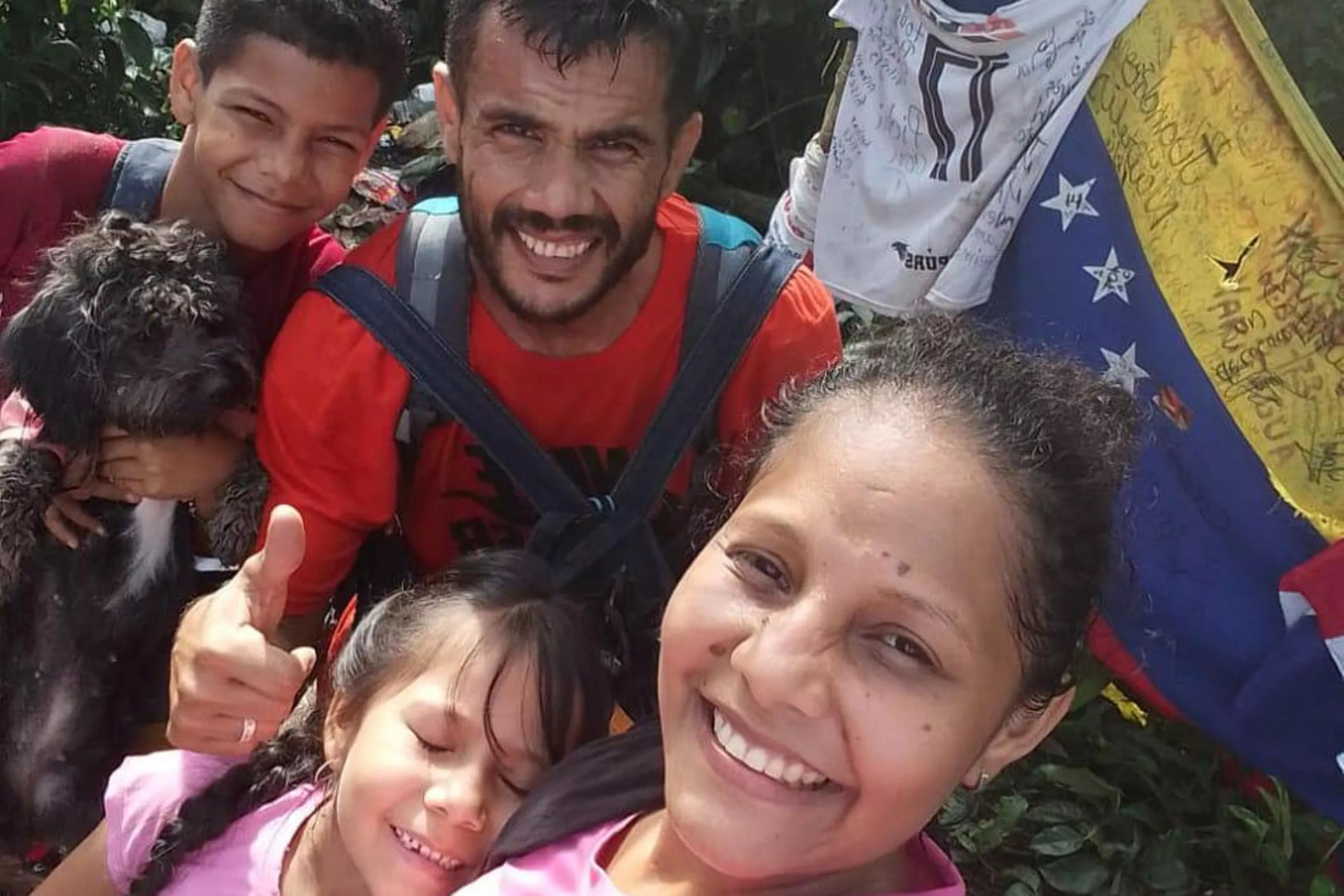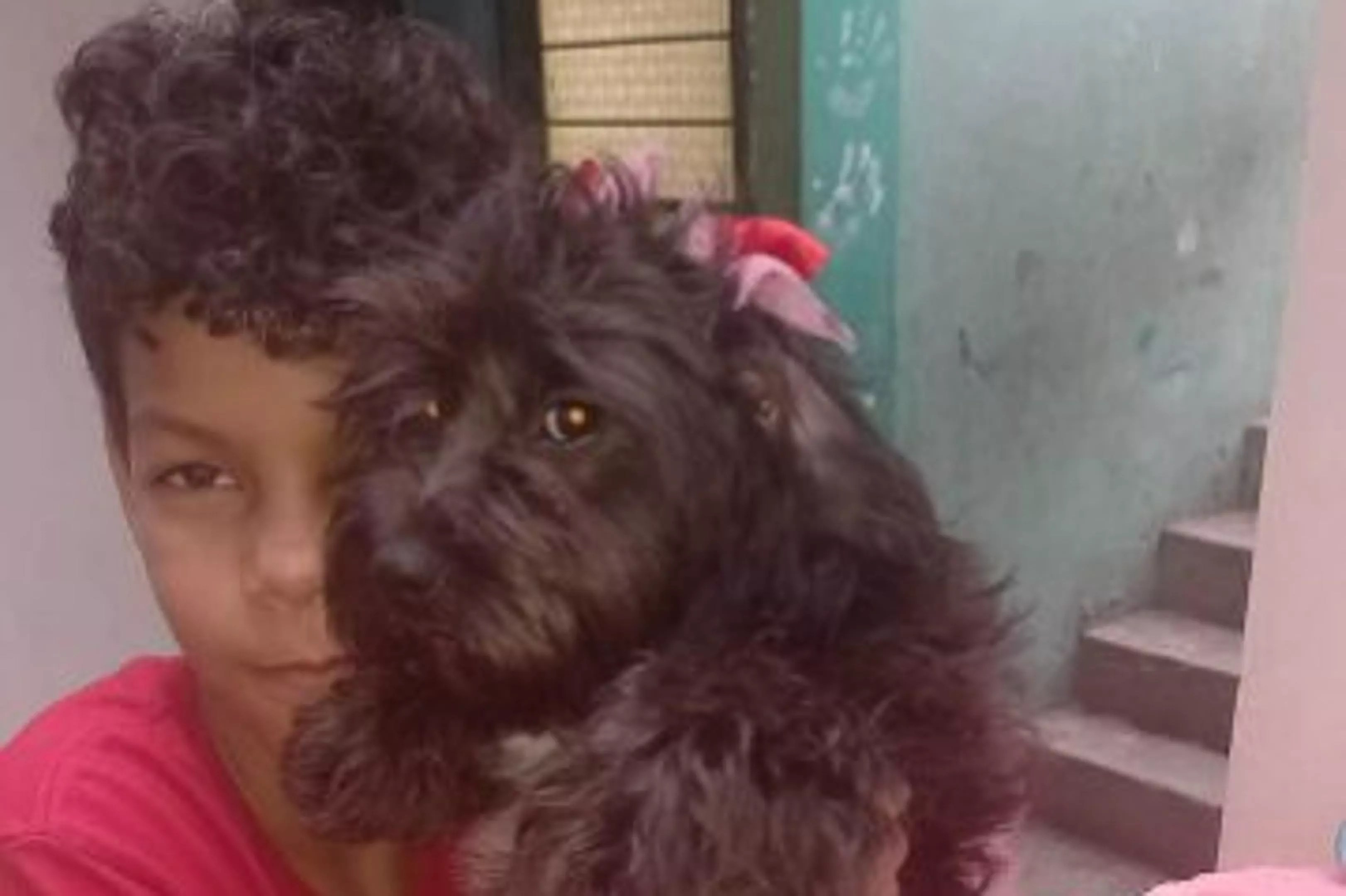
Courtesy of Rosemely Perez

Audio By Carbonatix
When Rosemely Perez saw Mia, a one-month-old puppy with curly black hair, “it was love at first sight,” Perez recalls.
“She has this very small, cute face that’s so precious,” Perez says. “As soon as I saw her, I knew she was the dog I wanted.”
Perez, her two children and her husband were living in Peru in August 2022, having left Venezuela over a year earlier as their country’s economy faltered. Her husband proposed adopting a dog for her 27th birthday, because Perez was a lifelong animal lover, and she found this one on Facebook. The puppy had already been named – Mia means “mine” in Spanish – but when she was adopted, Perez added “Fernanda” because she liked how the two names sounded together. With that, Perez made Mia Fernanda her own.
She took Mia Fernanda to the vet and had her vaccinated. During the next year, Mia “was raised like a child. She was very close to me. She was always very close to me,” Perez says.
“She started to share with the family. The family cared for her with lots of love,” Perez says. “She was always given attention like a person – the vet, vaccinations, everything. If she got sick, I would take her. She was very spoiled.”
But aside from the dog, the family wasn’t enjoying life in Peru and decided to make the journey to the U.S., as tens of thousands of other Venezuelans had done.
Earlier that year, a friend had arrived in a city they had never heard of called Denver, and he encouraged the family to go there because it’s “good, it’s nice, it has nice weather, if we come to Denver, they don’t discriminate,” Perez says.
Denver was nine countries away, but on July 31, 2023, six of them – Rosemely, her two kids, her husband, her sister and her sister’s boyfriend – started the trek with Mia Fernanda in tow. They walked across Ecuador into Colombia, and Mia “suffered like we did,” Perez recalls. As the family went through the Dorien Gap, a forested and mountainous region leading from Colombia into Panama traveled by many migrants, the dog “reached a point where she couldn’t walk anymore. Her little paws were red and sore,” Perez says, so the family took turns carrying her in their backpacks or in their arms.
They continued on through Costa Rica, Nicaragua, Honduras, Guatemala and Mexico. Other migrants they encountered didn’t think it was a good idea to take the dog and advised Perez to leave her behind. “A lot of people were telling me, ‘Leave her, leave her, you’re not going to be able to keep going with her,'” Perez recalls. “I would say, no! she’s my Mia!””
In Mexico, the two Perez children were kidnapped and held for ransom, which family back in Venezuela paid. And after three months, the six finally got to the border. Perez’s husband – who isn’t the father of her children – was stopped; immigration refused his bid to enter as a single male. Her sister’s boyfriend was also detained. But Perez, her children, her sister and Mia Fernanda were able to enter El Paso on October 22.
Perez didn’t have the documentation to prove Mia Fernanda was vaccinated, so to get her into the U.S., the dog was vaccinated again at an El Paso animal shelter, where she stayed while Perez, her kids and her sister were at a migrant shelter. A week later, they left for Denver after Jesuit Refugee Services, an international Catholic charity, bought them tickets on a bus that allows dogs.

Rosemely Perez and her family walked from Peru to the U.S. with their one-year-old dog.
Courtesy of Rosemely Perez
Once in Denver, Perez and her family were processed and offered housing at a Comfort Inn in Montbello that had been converted into a migrant shelter. They felt like they didn’t get enough to eat at the shelter, though, and on November 10, a friend with a car – the one who’d recommended they come to Denver – took them to his home for a meal.
On their way back to the shelter, in the tiny enclave of Mountain View, Perez saw a house with clothes on the front lawn. She asked her friend to pull over so that she could see if the items were for sale. It turned out that the home belonged to Andrea Ryall, who was using her yard as “a collection point” for donations of clothes, toiletries and school supplies.
Ryall is the founder of Highland Mommies & Neighbors, an offshoot of Highland Mommies created through a Facebook group that started helping migrants in early November. Perez, her children and her sister came to the front door “shivering” in “flip flops and T-shirts,” Ryall remembers, and asked about the things on her lawn. Ryall told them that the clothing was free for migrants, and although Perez insisted in broken English on paying, Ryall convinced her to take what she needed.
While Perez gathered boots and coats, she tried to talk to Ryall, who doesn’t understand Spanish. “In that moment,” Ryall recalls, “when we’re standing in my front lawn, a neighbor I had never met before walked by with her dog and was like, ‘What’s going on here?'”
The neighbor was Julia Keneipp, who speaks fluent Spanish and translated for Ryall and Perez. With her help, Perez shared that her kids were kidnapped, her husband detained and “that one of her biggest worries in that moment was that she was going to lose her dog,” Ryall says.
Mia Fernanda had been taken to a city animal shelter as part of Denver’s Temporary Pet Housing Program. In a few days, the dog’s time at the shelter would run out, since the city has a two-week limit on shelter stays for pets.
“My neighbor just looked her in the eyes and told her, ‘I’m going to help,'” Ryall says. “She vouched to help in that moment, which is great.”
Keneipp stepped up to help in other ways. She bought clothes and food for the kids. Although Perez could remain at the shelter until December because she had children, Perez’s sister had to leave after two weeks because she was on her own. Keneipp paid for a week at a Super 8 motel, where the family could stay until they found another place.
On November 12, Keneipp picked up Mia Fernanda from the animal shelter and took her to stay with her in-laws, who live in the Denver area, instead of keeping the dog herself; one of Keneipp’s dogs was undergoing chemotherapy and was immuno-compromised, and her other dog is a rescue and aggressive.
“My in-laws graciously offered to foster the dog for a week or two,” says Keneipp, who adds that she spent “$200 at Petco for food, a bed, chew toys” before dropping off Mia Fernanda.
But then her in-laws called a few days later, “saying the dog was incredibly sick,” she recalls.

Mia Fernanda is part of the family.
Rosemely Perez
“It had been diagnosed with a variety of parasites: giardia, hookworms, elevated white blood cell count, an abdominal abscess, several teeth requiring extraction and a very menacing infection called cryptosporidium, which is lethal if untreated and transferable not only to other dogs but to humans,” Keneipp says. “I informed Rosemely of the situation and the severity. The dog needs very significant treatment or else it was going to face a slow and painful death.”
According to WhatsApp messages, Keneipp updated Perez about these ailments on November 23. Perez asked, “Where do you have [Mia] I want to see her please,” then added, “I don’t want Mia to die on me.”
“No one wants Mia Fernanda to die,” Keneipp responded, without answering Perez’s request to see her. She went on to say that the cost of treating the dog’s ailments was between $2,075 and $3,275, and “if I take her back to the animal shelter, what’s going to happen is euthanasia.”
Keneipp then made Perez a recommendation: “If she returns with you, without a shelter nor the ability to pay the vet costs, she will suffer and she will probably die in a slow and painful way,” according to the WhatsApp messages.
“I know that your whole family came here to look for a better life,” Keneipp continues. “What I would recommend is that you leave her there with [Keneipp’s in-laws] but it would be a permanent adoption if they’re going to spend the money. It’s the only way she will survive.”
“We want to see her,” Perez responded. “My son is crying a lot for Mia.”
Keneipp tells Westword that Mia Fernanda “was diarrheaing and vomiting and wouldn’t eat, very, very sick.” She adds, “My in-laws said, ‘Look, we’ll care for this dog and pay the thousands of dollars it’s going to require to get her well and healthy – and it’s still ongoing – but we’re not going to pay all that money until it’s a permanent adoption scenario.”
Denver’s Temporary Pet Housing Program “is generally just housing” and doesn’t look for medical problems, says Tammy Vigil, spokesperson for the Department of Public Health and Environment, which runs the city shelters. If a pet in the housing program does need medical assistance, a community engagement team will help the pet find veterinary care. The only reason a dog would be euthanized is “if it’s suffering and can’t be saved,” Vigil adds.
During the days that followed, Perez would ask Keneipp each morning for updates and pictures of Mia Fernanda. Keneipp usually didn’t have much information or photos to offer, saying that she hadn’t seen her in-laws or was out of town.
“It’s not going to be possible to see her,” Keneipp told Perez on December 6. “I know that you all are very sad but you have to focus on getting a house/work/school. What’s happening with her is very serious, and it didn’t appear suddenly. She has various infections from consuming contaminated water and food – supposedly on the walk. She didn’t get sick from depression. She got sick from parasites and worms.”
By now, Perez and her family had moved from the Super 8 to the home of a woman Ryall had introduced to Perez. On December 15, she texted Keneipp from Perez’s number and told her that Perez “is interested in paying back the vet bills and we will help.”
Keneipp did not respond. On December 21, Perez texted her again: “Mrs. Julia, I wouldn’t want to come to extreme measures. If you haven’t given a reason for Mia, I’m going to put in a complaint because it’s not right that you haven’t responded and I want to get my dog back.”
On December 23, Keneipp finally responded. “Sorry for the delay of my response…clearly I also don’t want to come to extreme measures. The facts are that you accepted this situation by asking me to pick up the dog,” she wrote. “You’re more than welcome to present a police report. I’ve consulted with a law firm. You’re more than welcome to consult with the police. It won’t end well for your immigration case.”

Mia Fernanda, all gussied up.
Rosemely Perez
On December 31, Keneipp sent her last message to Perez: “I’ve consulted with a lawyer about this situation after our last WhatsApp chat in which you mentioned a police intervention. My lawyer has advised me to send you this documentation and that I put an end to our correspondence.” The documentation was a list of Mia’s ailments confirmed by a vet and the release form from the Denver animal shelter proving that Keneipp had picked up the dog.
Keneipp then blocked Perez, who contacted the Denver Police Department. At about 4:45 p.m. on January 12, Keneipp was working at home when “I hear a boom, boom, boom on my door,” she recalls. “It was two police officers with their hands on their weapons responding to a stolen dog 911 call.”
Keneipp showed the officers the documents proving that she had picked up the dog from the shelter and was taking care of her, then filed her own incident report with the Mountain View Police Department. Keneipp’s lawyers told her that the case was a civil matter, she says, meaning she could face a lawsuit from Perez but not any charges for allegedly stealing Mia Fernanda.
Keneipp says that “because the situation has gotten so ugly,” she won’t let Perez visit the dog – although she hadn’t allowed it earlier, either – and has no intention of asking her in-laws to return the dog. “I’ve been threatened and harassed,” Keneipp says. “This has turned into an absolute nightmare, not to mention a complete headache and an illogical hot mess.”
In fact, Keneipp has been so worn down by the situation that she admits, “I never want to see the dog again. It’s caused me so much trauma.”
Perez hasn’t seen Mia Fernanda since the dog went to the shelter near the beginning of November. Ryall says she can’t help but feel “protective over a family that showed up at my house one night freezing, looking for help,” and that “the way to fix this, the way to rectify this is the elderly couple that believes they own this dog when they do not needs to return the dog.
“It’s her dog. She cares enough about that dog to have taken it on the insane journey to America,” Ryall continues. “And I fully believe she’s not going to stop fighting until she gets her dog back. I do feel that she was taken advantage of and that in no circumstance is it okay to take someone’s dog to offer to help them and then never give them back their dog.”
Keneipp says that her in-laws have already started Mia Fernanda’s expensive treatment, but Perez insists she’ll reimburse them and continue the care.
“I know Rosemely and her kids love that dog,” Ryall says. “I have no doubt they will do whatever it takes to make sure that dog is in good care. They’ve proved that in a situation where they don’t even know when they’re going to eat next or where they’re going to live, they were still worried about the dog.”
Ryall has seen her community help “hundreds and hundreds of migrants” since early November, and says that “this is the one-and-only situation between a community member and a migrant where there’s been a conflict.” It needs to remain the only one, she adds.
“When a community makes a decision to do what is right and get involved in the lives of the families and individuals that have flooded our city who need help, the ones who are at risk here, the ones who are most vulnerable in that situation is honestly the migrants.”